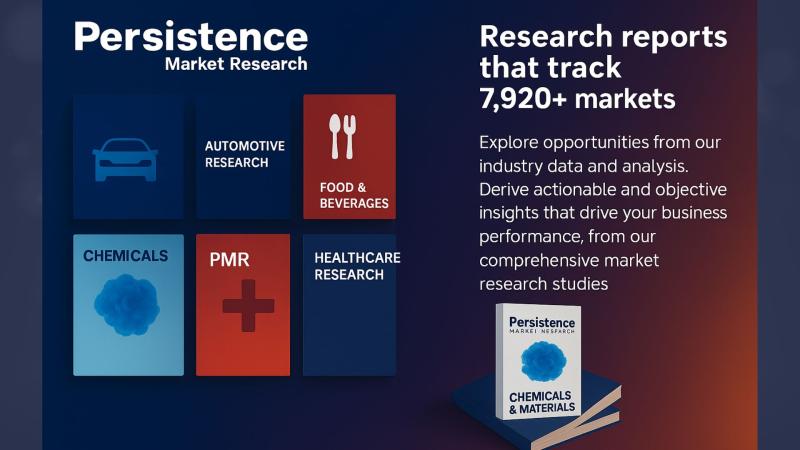Press release
Smart Container Market to Reach US$ 21.5 Bn by 2032 with 19.6% CAGR Fueled by Real-Time Tracking and IoT Integration
✅Overview of the MarketThe smart container market is witnessing exponential growth, driven by the rising need for real-time monitoring, automation, and supply chain transparency across global industries. Smart containers are equipped with sensors, GPS, and IoT technologies to provide real-time data on location, temperature, humidity, vibration, and security, enabling efficient cargo tracking and inventory management. With global trade volumes rising and logistics complexities growing, the demand for smarter, more connected transportation infrastructure is gaining momentum. According to the latest study by Persistence Market Research, the global smart container market is likely to be valued at US$ 5.2 Bn in 2025 and is projected to reach US$ 21.5 Bn by 2032, expanding at a CAGR of 19.6% during the forecast period.
The market's upward trajectory is primarily fueled by the growing adoption of advanced digital technologies in logistics and supply chain operations. Industries such as pharmaceuticals, food and beverages, and chemicals are increasingly turning to smart containers to ensure the safety and integrity of sensitive cargo during transit. Among the various segments, hardware components, especially GPS and temperature sensors, lead the market due to their critical role in condition monitoring. Geographically, North America dominates the smart container market, owing to its highly developed logistics infrastructure, early adoption of IoT technologies, and strong presence of key market players. However, Asia Pacific is emerging as a high-growth region due to expanding trade volumes, rapid industrialization, and increasing investments in smart logistics solutions.
🔗Get a Sample PDF Brochure of the Report (Use Corporate Email ID for a Quick Response): https://www.persistencemarketresearch.com/samples/35533
✅Key Market Insights
➤ Growing demand for real-time tracking and condition monitoring is fueling rapid adoption of smart containers in global logistics.
➤ North America remains the market leader, driven by strong technological infrastructure and robust regulatory compliance in cargo safety.
➤ Pharmaceutical and perishable goods industries are key end-users, requiring temperature-controlled and traceable transport solutions.
➤ Integration of AI and IoT platforms is enabling predictive maintenance and improved route optimization for container fleets.
➤ Rising environmental concerns are pushing companies to use smart containers to reduce spoilage, energy usage, and emissions.
✅What is driving the rapid growth of the smart container market?
The rapid growth of the smart container market is primarily driven by the increasing need for real-time visibility and condition monitoring in global supply chains. Companies are under pressure to ensure cargo safety, prevent losses, and meet compliance standards, especially in sensitive sectors like pharmaceuticals and perishables. Smart containers, equipped with IoT, GPS, and sensor technologies, help address these challenges by providing actionable insights. Additionally, the surge in e-commerce, global trade expansion, and growing focus on sustainability and digitalization in logistics further contribute to the market's accelerated growth and widespread adoption.
✅Market Dynamics
Drivers:
A key driver of the smart container market is the demand for enhanced supply chain transparency and control. Logistics companies and shippers are increasingly prioritizing cargo visibility and data-driven decision-making to reduce losses, improve efficiency, and meet stringent regulatory standards. The integration of IoT, AI, and big data analytics allows companies to track shipment conditions, optimize routes, and predict maintenance needs, significantly enhancing overall operational effectiveness.
Market Restraining Factor:
One of the main restraints is the high initial investment cost associated with smart container hardware, connectivity, and integration platforms. Small and mid-sized logistics companies may find it challenging to afford the deployment of smart technologies, particularly when operating on tight margins. Moreover, concerns over data security and interoperability across different systems can hinder adoption in certain regions.
Key Market Opportunity:
There is a major opportunity for growth in developing economies where digital transformation in logistics is still in early stages. Governments and private players in regions like Latin America, Africa, and Southeast Asia are investing in smart infrastructure to modernize trade operations. This opens up significant room for smart container solutions to penetrate untapped markets and drive global logistics innovation.
✅Market Segmentation
The smart container market is segmented based on component, technology, and end-use industry, each contributing to the dynamic nature of market expansion. By component, the market is divided into hardware, software, and services. The hardware segment, comprising sensors, GPS units, and connectivity modules, holds the largest share due to its foundational role in enabling smart functionalities. However, the software segment is growing rapidly as companies increasingly invest in analytics platforms, mobile applications, and cloud-based control systems for enhanced operational visibility and data analysis. Service providers offering integration, maintenance, and analytics support are also gaining traction as companies look for end-to-end solutions.
By end-use industry, the market includes food & beverages, pharmaceuticals, chemicals, oil & gas, and others. The pharmaceutical sector stands out as a major contributor due to the critical need for temperature-sensitive and compliance-driven transportation. Likewise, the food and beverage industry requires smart containers to maintain freshness, avoid spoilage, and monitor transit conditions. Chemical and energy sectors also benefit from real-time hazard tracking and leak detection. As supply chains become more complex, these segmented solutions allow stakeholders to tailor their smart container systems to meet industry-specific demands and compliance protocols.
✅Regional Insights
Regionally, North America leads the global smart container market, supported by strong investments in digital logistics, advanced supply chain infrastructure, and early technology adoption. The U.S. plays a pivotal role in setting global standards in smart shipping practices and is home to several key players that are driving innovation in container tracking, temperature monitoring, and predictive maintenance. Europe follows closely, driven by stringent environmental and cargo handling regulations, especially in the pharmaceutical and food sectors.
Meanwhile, Asia Pacific is emerging as the fastest-growing region due to booming exports, growing e-commerce penetration, and rising cross-border trade activities. Countries like China, India, Japan, and South Korea are experiencing significant developments in transportation infrastructure and smart city logistics, making the region a hotspot for smart container adoption. Latin America and the Middle East & Africa are also gradually entering the market landscape, driven by modernization efforts and increasing emphasis on trade efficiency and transparency.
🔗Dive deeper into the market data: https://www.persistencemarketresearch.com/market-research/smart-container-market.asp
✅Competitive Landscape
The smart container market features a mix of established tech companies, logistics giants, and emerging startups. These players are focused on expanding their product offerings, enhancing sensor technologies, and forging strategic partnerships to gain competitive advantage.
✅Company Insights
✦ IBM Corporation
✦ ORBCOMM Inc.
✦ Ambrosus Technologies GmbH
✦ Globe Tracker ApS
✦ Traxens SA
✦ Nexxiot AG
✦ Emerson Electric Co.
✦ Philips Connect Technologies
✦ CMA CGM Group
✦ Zillionsource Technologies
✦ Sensitech Inc.
✅Key Industry Developments
In recent years, several significant developments have taken place in the smart container market. ORBCOMM partnered with global shipping lines to expand their smart container fleet, enhancing global visibility and data access across sea and land logistics. Traxens introduced advanced smart container solutions featuring multi-sensor platforms for real-time monitoring of cargo conditions in challenging maritime environments.
Meanwhile, IBM has been focusing on integrating blockchain with smart containers to create secure and transparent cargo tracking systems. This allows all supply chain participants to access immutable records of container conditions and movements, enhancing trust and reducing fraud. Philips Connect is also investing in edge analytics and AI-powered alert systems to provide actionable insights in real time, enabling proactive decision-making and reducing downtime.
✅Innovation and Future Trends
The future of the smart container market is deeply tied to AI, blockchain, and edge computing. Innovations are centered around predictive analytics for container health, AI-driven route optimization, and machine learning models that detect anomalies in cargo handling. Startups are also developing smart tags and energy-efficient sensors that can self-calibrate based on environmental changes, further improving the reliability of container monitoring.
Blockchain is expected to play a critical role in transforming container logistics by offering transparent, tamper-proof documentation and streamlining customs processes. As the industry evolves, interoperability and integration across platforms will become vital, enabling seamless communication between different stakeholders in the supply chain. Additionally, solar-powered containers, autonomous freight handling, and digital twins are poised to redefine the way global trade is conducted, setting the stage for a smarter, more sustainable logistics ecosystem.
✅Explore the Latest Trending "Exclusive Article" @
• https://www.linkedin.com/pulse/golf-club-market-growth-driven-youth-female-participation-ewdtf/
• https://www.instagram.com/p/DMplBXqIOq9/
• https://in.pinterest.com/pin/1049549888167579315
• https://x.com/prnewssync/status/1949794948548890756
• https://industreenews.wordpress.com/2025/07/29/india-discovers-strategic-goldmine-in-rare-earths-whats-next/
✅Contact Us:
Persistence Market Research
G04 Golden Mile House, Clayponds Lane
Brentford, London, TW8 0GU UK
USA Phone: +1 646-878-6329
UK Phone: +44 203-837-5656
Email: sales@persistencemarketresearch.com
Web: https://www.persistencemarketresearch.com
✅About Persistence Market Research:
At Persistence Market Research, we specialize in creating research studies that serve as strategic tools for driving business growth. Established as a proprietary firm in 2012, we have evolved into a registered company in England and Wales in 2023 under the name Persistence Research & Consultancy Services Ltd. With a solid foundation, we have completed over 3600 custom and syndicate market research projects, and delivered more than 2700 projects for other leading market research companies' clients.
Our approach combines traditional market research methods with modern tools to offer comprehensive research solutions. With a decade of experience, we pride ourselves on deriving actionable insights from data to help businesses stay ahead of the competition. Our client base spans multinational corporations, leading consulting firms, investment funds, and government departments. A significant portion of our sales comes from repeat clients, a testament to the value and trust we've built over the years.
This release was published on openPR.
Permanent link to this press release:
Copy
Please set a link in the press area of your homepage to this press release on openPR. openPR disclaims liability for any content contained in this release.
You can edit or delete your press release Smart Container Market to Reach US$ 21.5 Bn by 2032 with 19.6% CAGR Fueled by Real-Time Tracking and IoT Integration here
News-ID: 4133571 • Views: …
More Releases from Persistence Market Research

Custom Leadership Development Program Market Set for Strong Expansion, Reaching …
The global custom leadership development program market is experiencing a significant surge, fueled by rapid organizational transformation, rising demand for personalized learning models, and the increasing need for future-ready leadership capabilities. As businesses face evolving challenges-from digital disruption to workforce diversification-tailored leadership development solutions have become essential for enhancing performance, strengthening organizational culture, and building agile leadership pipelines.
Get a Sample PDF Brochure of the Report (Use Corporate Email ID for…

Blister Packaging Market to Reach US$39.7 Bn by 2032 Driven by Strong Demand for …
The Blister Packaging Market is gaining significant momentum worldwide as industries increasingly seek secure, tamper-evident, and cost-efficient packaging formats that enhance product integrity. According to the latest study by Persistence Market Research, the global blister packaging market is projected to be valued at US$24.7 billion in 2025 and is expected to reach US$39.7 billion by 2032, expanding at a CAGR of 7.0% during the forecast period of 2025-2032. This steady…

Self-Heating Food Packaging Market to Reach US$100.7Bn by 2032 Driven by Demand …
According to the latest study by Persistence Market Research, the global Self-Heating Food Packaging Market is poised for strong growth, with its value expected to rise from US$73.5 billion in 2025 to US$100.7 billion by 2032, reflecting a CAGR of 4.6% during the forecast period. This growth is largely attributed to increasing consumer demand for ready-to-eat convenience, expanding outdoor recreation trends, military and emergency food supply needs, and rising adoption…

Bed Linen Market Set for Strong Growth, Reaching US$55.9 Bn by 2032, Says Persis …
The global bed linen market is witnessing robust growth, driven by increasing consumer inclination toward premium home textiles, rising focus on interior aesthetics, and expanding demand for comfort-oriented bedding solutions. As living standards improve and the home décor trend intensifies worldwide, bed linens have evolved from basic functional items to lifestyle-driven products emphasizing quality, design, and sustainability.
Request a Sample: https://www.persistencemarketresearch.com/samples/33822
Growing awareness around sleep health, coupled with rapid urbanization and rising…
More Releases for Smart
Smart Cities Market is Expected to Witness CAGR of 17.3% by 2027 with Applicatio …
A smart city is an urban unit or area that uses various types of electronic Internet of Things (IoT) devices to collect data and then use the insights to manage resources, assets, and services effectively. Green building is a growing trend in the global smart cities market. Constructing eco-friendly infrastructure facilities can provide a sustainable environment in the cities. Moreover, governments are focused on constructing energy-efficient buildings, in order…
Internet of Things (IoT) Devices Market By Type (Computing Devices, Smart Media, …
On a global scale, the Internet of Things (IoT) Devices market is currently showing significant development. The innovative methods and market study have helped many of the major players Samsung Electronics, Apple, Lenovo, ASUS, Acer, Huawei, Coolpad, LG Electronics, Google, Panasonic, Microsoft, Brother Industries, Honeywell, Fitbit, Lenovo to carve a name for themselves in the competitive global market. The Internet of Things (IoT) Devices market is experiencing a massive growth…
Global Smart Cities Market by Component (Hardware, Software) by Application (Sma …
Global Smart Cities Market: Overview
The global smart cities market is expected to reach a mark of over USD 3000 billion by 2024, at a CAGR over 21% during the forecast period. Significant growth in next-generation technologies such as artificial intelligence AI, personalized healthcare, sustainable energy generation and robotics are driving the smart cities’ future. Moreover, the increase in residential preference towards the adoption of advanced information and communication technologies ICT…
Global Smart Infrastructure - A Smart Approach To Smart Cities In 2016
Slowly but surely we are beginning to see a transformation take place in many parts of the world, as governments and councils realise they need to take a holistic approach to future city-wide development. In Australia, for example, we see that Adelaide, Canberra, Newcastle, Lake Macquarie, Sydney, Ipswich and Sunshine Coast have all been identified as being among the leading smart cities. The Netherlands also has great examples of emerging…
Global Smart Infrastructure - A Smart Approach To Smart Cities In 2016
The global smart city transformation is underway
Slowly but surely we are beginning to see a transformation take place in many parts of the world, as governments and councils realise they need to take a holistic approach to future city-wide development. In Australia, for example, we see that Adelaide, Canberra, Newcastle, Lake Macquarie, Sydney, Ipswich and Sunshine Coast have all been identified as being among the leading smart cities. The Netherlands…
Smart Kitchen Appliances Market ( Smart Refrigerators, Smart Dishwashers, Smart …
The rising demand for smart kitchen appliances is linked to their premium design that offers better effectiveness and more comfort than their traditional counterparts. With energy efficiency at its core, the global market for smart kitchen appliances is expected to surge at a robust pace in the near future.In a report titled “Smart Kitchen Appliances Market - Global Industry Analysis, Size, Share, Growth, Trends and Forecast 2014 - 2022,” Transparency…
